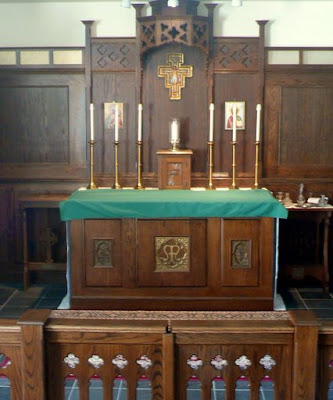Recently a Lutheran acquaintance wondered about the Orthodox understanding of the certainty of salvation. Like many looking into Orthodoxy, this person did not find much of an answer to the question, "How can I be sure that I am saved."
Too often I've heard such a well-meaning question dismissed with the words like these: "That's not the right question." Such a frustratingly typical answer which is often taken to belittle both the questioner and a well-meaning, searching question!
What needs to be understood is that the question is driven by Luther's question ("How do I know that I have a gracious God"). The prominence of this individual quest by Luther has prompted Lutherans and Protestants to place a great deal of stock in the surety of faith. As one who has was schooled by the question and so understands the angst behind it, permit me to suggest that it reveals a need to be convinced that God is merciful, that He loves men as they are, and that regardless of what they've done or their past He accepts, welcomes and forgives them.
There is nothing in those words that the Orthodox dispute. The Orthodox agree that God is merciful, forgiving, kind, and loving, and that we need constantly to be reminded of this since we are prone to forget it or live as if it doesn't matter.
However, we would question why one needs to know for certain that which is a given; namely, that God is gracious, merciful, loving, etc. We would wonder how God could be otherwise since God is (i.e., both essentially and energetically; or metaphysically, epistemologically and experientially) love.
We would also wonder at the hubris of such a question. In other words, the focus of the question is on me (the individual) and my surety rather than on God and His grace. Notice the grammar: How can *I* be certain that God is who He is. Deep down, it seems to suggest that God is gracious only if I find Him to be so. Such a Cartesian method plays well in a post-Renaissance mindset but it, at base, quite prideful and not within the "mind of Christ" (Philippians 2).
Above all, however, we would question what is not said; namely, that this emphasis on the surety of faith quickly leads either to an antinomianism or to an abstraction (or both), and away from the primary narrative in Scripture--that the love God is calls us not to nearness or friendship but to an intimate participation and union; that God invites us to be "wrapped up" in Him (i.e., in the love His gives and does but, of course, not the love that he metaphysically is).
To the first (antinomianism), Luther of course emphasized "faith alone, but faith is never alone." This emphasis of faith and love is seen most clearly in Luther's sermons. However, the most unLutheran notion of total depravity (if not in so many words) has captivated Lutherans and Lutheranism to the point that they apologize for or downplay the necessity for works of love. Furthermore, when these works of love are emphasized, the key works of repentance and humility are not seen as works of love, and are not often seen as the key works.
To the second (faith as abstraction), we would wonder why justification (which is, as Lutherans properly teach, the work of Christ) becomes greater than Christ; to the extent that some would vociferously maintain that not Christ but Christ's justifying work is the chief article (Hauptartikel). The two, we would say, cannot and ought never be separated since the person (hypostasis; essence) cannot be understood apart from His work (energon; deeds), and vice versa. We would maintain that the loss, in late medieval Western theology, of the distinction in one person/nature of essence and energy has led to this abstract understanding of faith in grace. (Note the grammar of the formula: justified by grace through faith--where is God or Christ except as an understood modifier, and all the other words are abstract concepts!) We would further point out that this loss is the result of a de-emphasizing (or, to be precise, a de-personalizing) of the Spirit.
It is precisely the person of the Holy Spirit that Orthodoxy points to as the necessity for the binding together of individuals in love to God and one another. And what is key, then, is not personal surety of one's standing before God, but the relationship that the Spirit calls us to--a relationship of the fullness of love in the God who is love which then, of necessity, binds us to all whom (persons) and which (creation) God loves. Or, to ask it juridically: After one is declared not guilty or righteous (or "made righteous" as the Lutherans sometimes affirm), then what? Does that not evoke a relationship between judge and judged? And if so, what is the nature of this relationship, and what keeps is growing, maturing, deepening? The Orthodox answer, which is only partially (and therefore incompletely, that is, unsacramentally) found amongst the pietists or those oddly accused of Osianderism (often the accusers don't understand the teaching of and charges against Osiander), we would see as an attempt to answer this very necessary relational question. And why is the relational question necessary? Because that is what God made us for--to live in union with Him. But now we are talking of theosis.

















